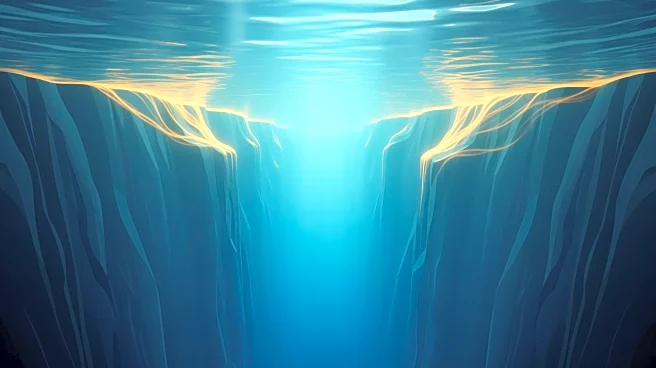What's Happening?
Recent research conducted by the Ocean University of China has revealed that the depths of the Arctic Ocean are warming more than previously expected. This warming is attributed to warmer Atlantic water
from near Greenland, which is heating up the depths of the Arctic Ocean. The study found that the waters between 1500 and 2600 meters deep in the Eurasian basin have warmed by 0.074°C since 1990. This warming represents the transfer of almost 500 trillion megajoules of energy, which could significantly impact sea ice extent if present at the surface. The research highlights the role of the Atlantic Meridional Overturning Circulation (AMOC) in bringing warm Atlantic water northwards, contributing to the warming of the deep ocean.
Why It's Important?
The warming of the Arctic Ocean's depths has significant implications for global climate patterns and the Arctic ecosystem. As the Greenland ice sheet melts, more freshwater enters the Greenland basin, slowing the sinking of cold, salty water and raising deep water temperatures. This process could contribute to sea ice melt and potentially thaw sub-sea permafrost, which includes frozen clathrates that could release methane into the atmosphere. Such changes could exacerbate global warming and impact marine life, as well as human activities dependent on Arctic conditions. Understanding these processes is crucial for predicting future climate scenarios and developing strategies to mitigate their effects.
What's Next?
The findings suggest that continued monitoring and research are necessary to understand the full impact of deep ocean warming on the Arctic environment. Scientists may focus on the potential release of methane from thawing permafrost and its implications for climate change. Additionally, international cooperation may be required to address the broader effects of Arctic warming, including its impact on global sea levels and weather patterns. Policymakers and environmental organizations might prioritize efforts to reduce greenhouse gas emissions and protect vulnerable Arctic ecosystems.
Beyond the Headlines
The warming of the Arctic Ocean's depths underscores the interconnectedness of global climate systems. It highlights the need for comprehensive climate models that account for deep ocean processes and their influence on surface conditions. The research also raises ethical considerations regarding the responsibility of nations to address climate change and protect the Arctic environment. Long-term shifts in ocean temperatures could alter marine biodiversity and affect indigenous communities reliant on Arctic resources. These developments call for a reevaluation of environmental policies and international agreements aimed at preserving the Arctic.









